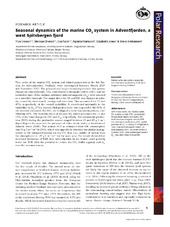Seasonal dynamics of the marine CO2 system in Adventfjorden, a West Spitsbergen fjord
Ericson, Ylva; Chierici, Melissa; Falck, Eva; Fransson, Agneta Ingrid; Jones, Elizabeth Marie; Kristiansen, Svein
Peer reviewed, Journal article
Published version

Åpne
Permanent lenke
https://hdl.handle.net/1956/20662Utgivelsesdato
2019-06-11Metadata
Vis full innførselSamlinger
- Geophysical Institute [1198]
Originalversjon
https://doi.org/10.33265/polar.v38.3345Sammendrag
Time series of the marine CO2 system and related parameters at the IsA Station, by Adventfjorden, Svalbard, were investigated between March 2015 and November 2017. The physical and biogeochemical processes that govern changes in total alkalinity (TA), total dissolved inorganic carbon (DIC) and the saturation state of the calcium carbonate mineral aragonite (ΩAr) were assessed on a monthly timescale. The major driver for TA and DIC was changes in salinity, caused by river runoff, mixing and advection. This accounted for 77 and 45%, respectively, of the overall variability. It contributed minimally to the variability in ΩAr (5%); instead, biological activity was responsible for 60% of the monthly variations. For DIC, the biological activity was also important, contributing 44%. The monthly effect of air–sea CO2 fluxes accounted for 11 and 15% of the total changes in DIC and ΩAr, respectively. Net community production (NCP) during the productive season ranged between 65 and 85 g C m−2, depending on the year and the presence of either Arctic water or transformed Atlantic water (TAW). The annual NCP as estimated from DIC consumption was 34 g C m−2 yr−1 in 2016, which was opposite in direction but similar in magnitude to the integrated annual air–sea CO2 flux (i.e., uptake of carbon from the atmosphere) of −29 g C m−2 yr−1 for the same year. The results showed that increased intrusions of TAW into Adventfjorden in the future could possibly lower the NCP, with the potential to reduce the CO2buffer capacity and ΩAr over the summer season.
